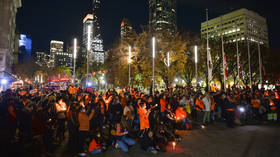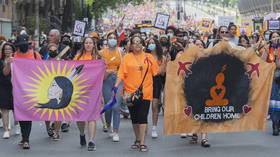Canadian MPs recognise genocide in residential schools

Canada’s House of Commons unanimously voted to approve a measure condemning the country’s notoriously abusive government-funded residential schools for indigenous children as a genocide on Thursday.
“Today I lift up survivors, families, and communities who have sacrificed so much in order for people across Canada to know the truth; that what happened in residential schools was a genocide,” Winnipeg Center MP Leah Gazan, who introduced the motion, said in a statement following the vote. She thanked her fellow lawmakers for “recognizing the truth of Canada’s history.”
“I look forward to working with the government to ensure the will of parliament is honored by formally recognizing residential schools as a genocide,” she continued, adding that “survivors deserve no less.”
The motion states that the schools, which the Canadian government forced some 150,000 First Nations, Metis and Inuit children to attend between the 1870s and 1997, met the UN’s definition of genocide, meaning an intention to destroy “in whole or in part, a national, ethnical, racial, or religious group.”
While popular understanding of the term generally interprets it to mean killing members of the targeted group, the definition also includes “deliberately inflicting on the group conditions of life calculated to bring about its physical destruction in whole or in part; imposing measures intended to prevent births within the group,” and “forcibly transferring children of the group to another group.”
While Gazan had previously attempted to introduce such a measure in June, it failed to receive unanimous assent the first time. Lawmakers’ shift in opinion could be attributed to the words of Pope Francis, who used the word “genocide” to describe the schools – many of which were run by the Catholic Church – after his visit to Canada in July.
A 2015 report from the Truth and Reconciliation Commission detailed egregious physical and sexual abuse, poor living conditions, and malnutrition at residential schools, describing them as “cultural genocide.” Some 3,200 pupils were found to have died from tuberculosis and other diseases, though the real number is believed to be higher. Despite some 37,951 claims by survivors of sexual or physical abuse, fewer than 50 former staffers were ever convicted of abusing the students.
The schools uprooted indigenous children from their families and communities and sought to assimilate them into Canadian society, including through religious conversion. While the Roman Catholic Church operated about three-fifths of the schools, they did not have a monopoly on converting the natives – the Anglican Church operated a quarter of the schools and the United and Presbyterian churches split the rest. Students were strongly discouraged from adhering to their cultural traditions, often even receiving new names.













